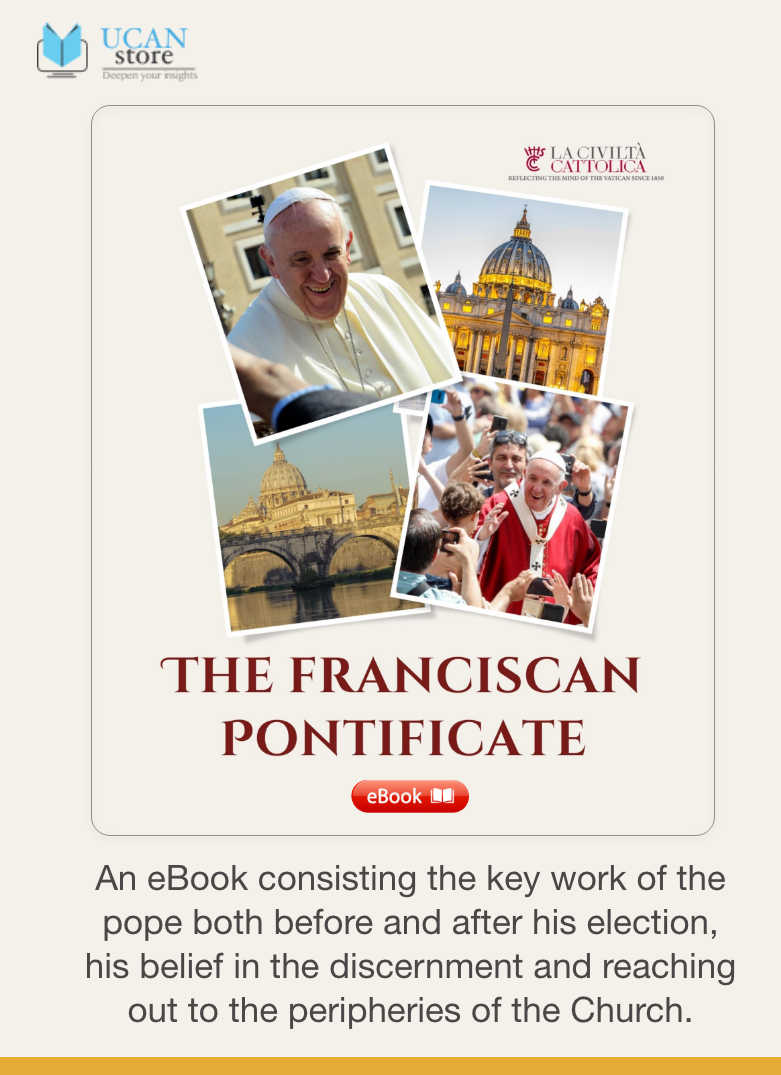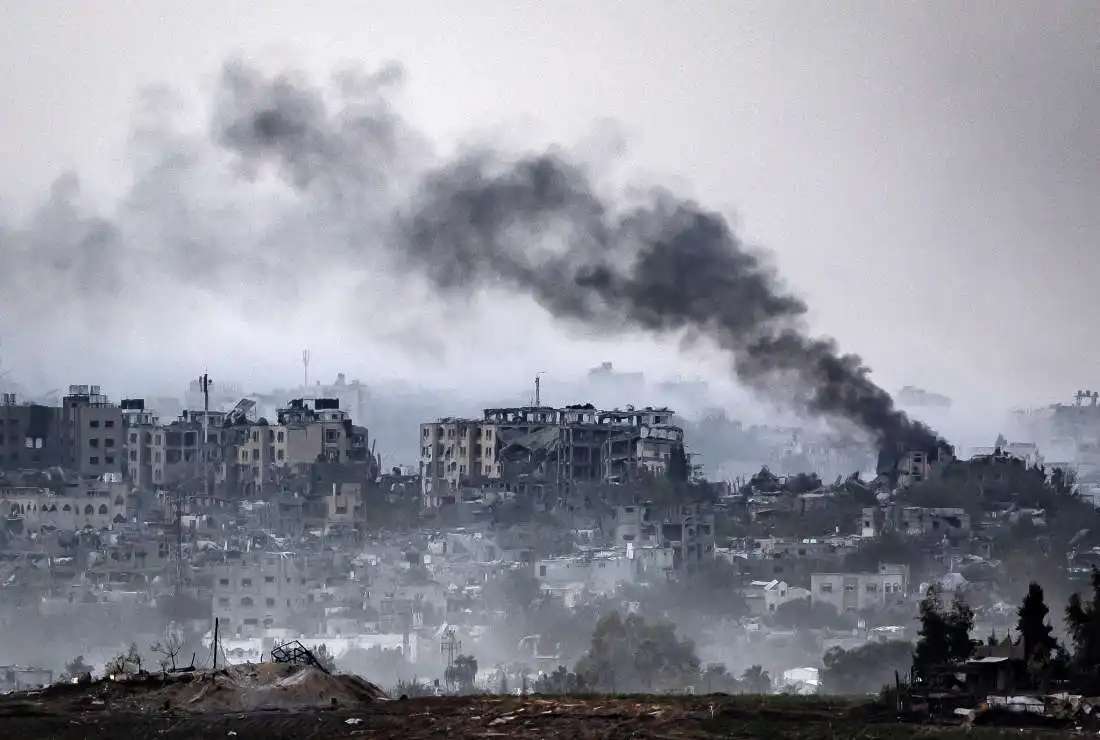

A picture taken from Israel's southern city of Sderot shows smoke rising during Israeli bombardment of the Gaza Strip on Oct. 29, amid ongoing battles between Israel and the Palestinian Hamas movement. (Photo: AFP)
Every religion possesses not just a faith structure for its members, but a political form as well, and history often reveals to us which is the dominant element, and for how long.
In Christianity, for instance, the dominant political form which carried on for nearly 2,000 years was called Christendom. It saw the pope not just as the spiritual head of the Church, but also as a powerful political ruler.
Popes waged wars, excommunicated rulers, and arbitrated between kings. But that was a long time ago. Today’s little Vatican territory in Rome and the office of internuncio are relics of a bygone imperium, which many in the Church look back with nostalgia.
One of the reasons why Pope Francis is disliked by so many Catholics is his utter rejection of pomp, pelf and privilege associated with an imperial Church. He hopes that “synodality” will create a discipleship of equals, just as Jesus wanted.
Other religions too flirt with power. The special political form in Judaism is Zionism, a movement for the re-establishment, development and protection of a Jewish nation in what is now Israel.
Zionist Israel is in conflict with many Arab nations, particularly with the Palestinians, whose lands it has usurped and whose very future is in jeopardy.
"In the turbulence of medieval Europe, the safest place for Jews or Christians was in a country governed by Muslim rulers"
For several centuries the Jews had no homeland of their own. In 70 CE, Roman legions under Titus, angered by Jewish insurrections in Palestine, utterly destroyed Jerusalem and forcibly displaced the inhabitants of Judea.
For almost 2,000 years, therefore, Jews lived in other countries, and under other governments.
Those Jews who relocated to Europe in small colonies of their own had to endure persecution and pogroms from their Christian neighbors. Christian Europe loathed the Jews, holding them responsible — erroneously, we would say today — for the death of Christ.
Curiously, it was quite different in the Muslim nations of the Mediterranean and West Asia. Here Jews lived in harmony with their Muslim and Christian neighbors as ‘protected people’(dhimmi) under Muslim law (sharia).
In the turbulence of medieval Europe, the safest place for Jews or Christians was in a country governed by Muslim rulers.
Islam as a religion has had both a spiritual dimension and a conscious political form. At its apex was the Caliph (khalifa, God’s regent), an office both spiritual and political, which passed through several mutations before being abolished by Turkiye’s Kemal Ataturk in 1924 when the Ottoman Empire collapsed.
But the nostalgia for a unified political authority persists in Islam, even today. Today the Wahhabis in Saudi Arabia exert a puritanical hold over the Saudi regime, the guardian of Islam’s holy places.
And in 2013 the brutal group known as ISIS (the Islamic State) sought to become another "caliphate" for a few years before being obliterated.
"It has taken barely one generation for the victims of oppression to become the world’s worst oppressors"
Still, the desire for local hegemony in Islamic West Asia is strong. Will it be Saudi Arabia? Or Egypt? Or Turkiye? Or even Iran, with a brand of Islam entirely its own? The tensions endure, often bursting into wars of attrition.
One cannot speak of Islamic West Asia without referring to the centuries of interference in local affairs by the colonial powers of Britain and France, and more recently, of America. There were three reasons for this interference: the first was control of the Suez Canal, the shortest sea route to the East. The second was the discovery of oil in Kuwait and southern Iraq in 1922.
But the third reason was the most fractious of all — the settling of the Jewish diaspora into Palestine after the Balfour Declaration of 1917, and the creation of the state of Israel in 1948.
Most nations see Israel as a settler colony of European/American origin, which having acquired its territory by war and terror, resolutely refuses to share its space with the Palestinians under “the two-nation formula.”
How tragic indeed that it has taken barely one generation for the victims of oppression to become the world’s worst oppressors, and thus true heirs of the Nazis.
For as the Indian newsmagazine Frontline puts it, “The Zionists have taken the rage of generations and turned it, not against the powerful West whose arms and support they need, but against those hapless civilians on whose lands they have settled.”
As the Somali feminist, Ayaan Hirsi Ali has perceptively noted, “No monotheistic religion has ever been a religion of peace.” This statement may be disconcerting to the Jews, Christians and Muslims among us who feel that “our” religion is the prime promoter of amity and concord among the nations.
And yet, only a quick look at history tells us that it is the “Abrahamic” religions that primarily have been responsible for most of the violence and war in the world, rather than the “Indic” religions of Asia, or the “animistic” religion of the indigenous peoples.
"The time has come to dismantle political form and all the havoc it has wreaked"
Why is this so? Is this because of a sense of “exceptionalism” on the part of the “children of Abraham/Ibrahim,” the sense that they are “chosen by God” and so not accountable to anyone? Certainly the settler colonies of the United States, Australia and South Africa had this ideology in mind when they wiped out the native indigenous populations in their respective countries or crowded them into reservations, reduccione and Bantustans.
The Zionist rulers of present-day Israel are only keeping to a well-known vicious tradition in their treatment of the Palestinians.
In one of the most prescient passages in his Gospel, the evangelist John has Jesus in conversation with a Samaritan woman.
The woman points to the shrine on Mt. Gerizim, adjacent, with a nod to Jesus, who being a good Jew she guesses, would only worship in Jerusalem. Jesus contradicts her: “Believe me, woman, the time coming when you will worship the Father neither on this mountain nor in Jerusalem. God is spirit, and those who worship him must worship in spirit and in truth.” [John 4.21-24]
Every religion, we stated at the start of this essay, has both a faith structure and a political form. The time has come for faith to challenge politics and hold it to account.
The time has come to dismantle political form and all the havoc it has wreaked, to reject all allusions to “Chosen People” and “Promised Land,” to punya bhumi (holy land) and pitrbhumi (fatherland), and live together as brother and sister under a common Father and Mother.
Ah, but will we ever?
In the answer to this radical question lies our human tragedy and our hopelessness.
*The views expressed in this article are those of the author and do not necessarily reflect the official editorial position of UCA News.


